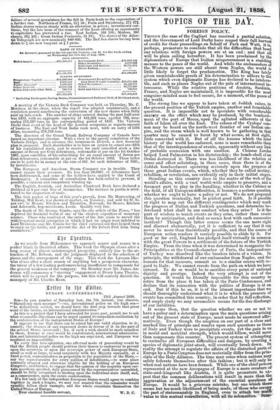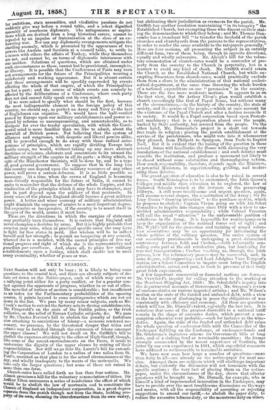TOPICS OF THE DAY.
FOREIGN POLICY.
THOUGH the case of the Cagliari has received a partial solution, and the Government of Lord Derby have reaped their full harvest of credit for their proceedings on behalf of Park and Watt, it is, perhaps, premature to conclude that all the difficulties that beset our relations with foreign powers are at an end : and that all will be plain sailing hereafter. It has been proclaimed by the diplomatists of Europe that Italian misgovernment is a standing menace to the peace of the world. And while the ambassadors of the Western powers are still absent from Naples, the world is little likely to forget the proclamation. The Ring has lately given unmistakeable proofs of his determination to adhere to the system which even diplomatic Europe has declared to be intolera-, ble, and such as places Naples out of the pale of international tercourse. While the relative positions of Austria, Sardinia, France, and Naples are maintained, it is impossible for the most sanguine-minded man to feel secure, for a moment, of the peace of the world.
The strong line we appear to have taken at Jeddah raises, in the present position of the Tukish empire, another and formidable question. It is impossible not to speculate with considerable anxiety on, the effect which may be produced, by the bombard- ment of the port of Mecca, upon the agitated adherents of the faith of Islam all over the East. The echoes of the Cyclops' can- non may be heard on the north-west frontier of our Indian em- pire, and the storm which is well known to be gathering in that quarter may be caused to burst by what seems, at first sight, little connected with it. But of all the lessons which the later history of the world has enforced, none is more remarkable than that of the interdependence of events, apparently without any link of probable connexion with one another. A Chinese Lorcha helped Lord Palmerston to his dictatorship ; the bomb-shell of an Orsini destroyed it. There was less likelihood of the relation of cause and effect subsisting, in these cases, than there is of the Jeddah bombardment operating seriously upon the progress of those great Indian events, which, whether they be called mutiny, rebellion, or revolution, are evidently only in their initial stages.
Standing as this country does in the centre of the web of the world's affairs, with a vast world-wide empire to preserve, and a foremost part to play in the handling, whether in the Cabinet or the field, of all European difficulties, it becomes a serious question whether we ought to have a policy or not. We do not propound this question ironically, but in perfect good faith. Is it possible or right to map out the different contingencies which may mark the progress of Italian and Turkish questions, and determine be- forehand what shall be our conduct when they arise ? Is it the part of wisdom to watch events as they arise, rather than create them by anticipation, and deal as seems best with each successive incident? Though this latter course seems the one more right and discreet abstractedly, yet it is sufficient to say that it can never be more than theoretically possible, and, that the course of Europeon action renders it scarcely possible to abide by it. For good or for evil, England has pledged itself virtually in common with the great Powers to a settlement of the future of the Turkish Empire. From the time when it was determined to reorganize the Principalities at the Council-chamber of Paris, the independence of Turkey was dissolved like the baseless fabric of a vision. In principle, the withdrawal of our ambassador from Naples, and the reasons for that measure, commit us to a similar course with re- gard to Italy. We cannot recede from the path on which we have entered. To do so would be to sacrifice every point of national dignity and prestige. Indeed the very attempt is out of the question. It would be literally impossible for this country to retire from the place it has taken at the Paris Conferences, and declare that its connexion with the politics of Europe is at an end. But if this be so, it is of the utmost importance that we should thoroughly understand what it is to which the pressure of events has committed this country, in order that by full reflection, and ample study we may accumulate means for the due discharge of our liabilities.
It seems then, that the question whether we are or not to have a policy and a determination upon the main questions arising out of the present state of Europe, must needs be answered affir- matively. Even though the adoption on our part of a clear and marked line of prinoiple and resolve upon such questions as those of Italy and Turkey were to precipitate events, yet the gain to TIR in moral and material strength, which would follow, would more than compensate this country. The present system of attempting to centralize all European difficulties and dangers, by creating a. species of diplomatic joint-stock, will eventually break down. In reality the attempt to regulate the affairs of the disturbed parts of Europe by a Paris Congress does not materially differ from the prin- ciple of the Holy Alliance. The time may come when nations may safely federate themselves after this fashion ; but it will only be when real nations have been formed. While one of the chief powers represented at the new Areopagus of Europe is a, mere creature of state-and-kingcraft like Austria, it is q,uite premature to ex- pect that the common deliberations will result in more than the aggravation or the adjournment of the essential questions of Europe. It would be a grievous mistake, but one which there seems but too much likelihood of being made, of those who occupy the part of statesmanship in England, even to attach too much value to this mutual consultation, with all its solemnities. Seou- kr ambitions, state necessities, and vindictive passions do not suddenly give way before a round table, and a select dignified sably of courteous diplomats. The antagonisms or aspira- tions which are derived from a long historical career, cannot be repealed by an impulse of fraternization at the close of an ex- hausting war. Nor can any diplomatic arrangements mitigate the rang anomaly, which is presented by the appearance of two powers like Austria and Sardinia at a council table, to settle in 3mmon with others the affairs of Turkey, while they themselves care not, and cannot be, on terms of diplomatic intercourse with one another. Solutions of questions, which are obtained under such circumstances as these, cannot but be provisional, incomplete, or illusory. It is possible that the Conferences of Paris may turn out arrangements for the future of the Principalities wearing a satisfactory and working appearance. But it is almost certain that these arrangements will be speedily superseded by events affecting the whole of that empire, of which the Principalities are but a part; and the course of which events can scarcely be affected by the deliberations of a Conference, where each party does not and cannot fully speak out its own mind.
If we were asked to specify what should be the first, because the most indispensable element in the foreign policy of this country, we should say, as perfect an Army and Navy as the best of Englishmen can organize. We would have the half-verdict passed by Europe upon our military establishments and power re- versed by reforms so uncompromising, and unmistakeable, as to dissipate for ever the trashy speculation, with which the Conti- nental mind is more familiar than we like to admit, about the downfall of British power. Not believing that the system of alliances and congresses, -with despotic and liberal powers alike, will be powerful enough to do away with those radical anta- gonisms of principles, which are rapidly dividing Europe into hostile camps, we would, without taking up any mere abstract doctrines or schemes, elaborate and concentrate to its utmost the military strength of the empire in all its parts : a thing which, in spite of the Manchester theorists, will be done by, and be a type of, good general government. To suppose that in the long run this country can depend upon the military resources of any other power, will prove a serious delusion. It is as little possible as necessary. At a time when the crown of England is becoming more directly responsible for the future of India, it cannot be amiss to remember that the defence of the whole Empire, and the vindication of the principles which it may have to champion, may yet in part depend upon the soldiery of that peninsula. In every sense of the phrase England should become a great military power. A better and wiser economy of military administration might diminish the expense of armies to a most important degree. But expensive or inexpensive, if the country is to assert itself in the eyes of the world, armies it must have.
These are the directions in which the energies of statesmen may profitably turn themselves. It is certain that England will never champion a doctrine by arms. But it is highly probable that occasion may arise, when in practical specific cases she may have to fight for free states in peril. Her wisdom will be to collect herself and her strength ; to permit no tampering at any council, whereof she is a member, with the sacred principles of free na- tional progress and right of which she is the representative and gaardian par excellence. And, above all, to place her military establishments upon a footing, which shall enable her to meet every eventuality, whether of peace or war.



























 Previous page
Previous page